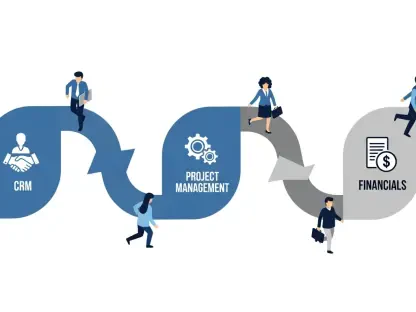Leveraging deep learning within low-code development platforms is revolutionizing the way intelligent, context-aware applications are built, significantly impacting the future of software development. By making intelligent, context-aware applications more accessible, these platforms are enabling a broader audience to create sophisticated applications with minimal coding knowledge. This article explores the various ways deep learning is revolutionizing low-code development, highlighting its impact on speed, accessibility, and innovation.
The Rise of Low-Code Development Platforms
Accelerating Application Development
Low-code development platforms have gained popularity due to their ability to speed up the application development process. With visual interfaces, users can design workflows, drag-and-drop components, and set up backend processes with minimal coding effort. This increased efficiency is particularly beneficial for organizations needing to quickly develop applications for both internal operations and customer-facing solutions. The streamlined nature of low-code platforms means that business analysts, managers, and other non-technical stakeholders can actively participate in the development process, making it faster and more collaborative.
This democratization of application development is not only about speed but also about bridging the traditional gap between IT and business teams. While conventionally, these platforms were limited to simple rule-based logic and straightforward workflows, the introduction of deep learning models has broadened their capabilities. Now, low-code platforms can handle more complex operations, interpret user contexts more effectively, and dynamically adapt to varying user needs. This has unlocked new potential for creating rich, responsive applications that offer a top-notch user experience across a variety of sectors.
Bridging the Gap Between IT and Business Teams
Low-code development platforms enhance agility by bridging the gap between IT and business teams. The traditional boundaries that kept IT departments firmly separated from business units are gradually dissolving, thanks to these platforms. Traditionally, low-code platforms focused mainly on simple workflows and rule-based logic. However, the integration of deep learning allows these platforms to now perform more sophisticated tasks, bringing a new level of intelligence to applications. With deep learning, applications can interpret context, make real-time decisions, and dynamically adjust their outputs based on user behavior or environmental factors.
Such capabilities are a boon for organizations, enabling them to produce more tailored and responsive applications. For instance, an e-commerce platform can use deep learning to analyze customer purchase patterns and tailor recommendations accordingly. This not only makes the application smarter but also significantly enhances the user experience. Ultimately, integrating deep learning with low-code platforms serves to blur the lines between IT and business, resulting in more cohesive and effective teams that can rapidly deploy innovative solutions to market.
Deep Learning: Enhancing Low-Code Capabilities
Identifying Patterns and Making Sense of Data
Deep learning excels at identifying patterns in large datasets and making sense of unstructured information, essential for creating context-aware applications. These applications go beyond simple user interactions to analyze behavior, location, time, and various environmental factors, delivering highly personalized content and suggestions. For example, an app equipped with deep learning might analyze a user’s interaction history and predict the next best action, offering services or products accordingly. This contextual awareness is pivotal in present-day application development, where user expectations are increasingly geared towards personalized experiences.
Moreover, deep learning allows developers to bypass traditional programming constraints. Instead of manually coding complex algorithms, developers can rely on pre-trained deep learning models within the low-code platform to handle intricate data analysis. This opens the door to sophisticated applications capable of, say, interpreting legal documents, analyzing medical records, or forecasting market trends—all without extensive coding expertise. As a consequence, organizations can deploy powerful AI-driven apps more efficiently, hastening their digital transformation journeys.
Improving Customer Service Applications
One of the most impactful areas where deep learning shines within low-code platforms is customer service applications. Deep-learning-enabled applications can understand and interpret customer queries, detect sentiment, and provide relevant responses, creating a more dynamic and responsive user experience. For instance, chatbots and virtual assistants can use deep learning to understand nuanced customer inquiries, identifying whether a customer is frustrated or satisfied based on contextual clues and adjusting their responses accordingly. This real-time interpretation and adaptability enhance customer satisfaction by delivering timely and appropriate support.
Additionally, deep learning models enable these applications to go beyond basic interaction. Deep learning can comb through vast amounts of customer data to detect patterns and draw insights that lead to more meaningful interactions. For example, a company might use an AI-driven chatbot to not only respond to customer questions but also suggest additional products based on purchase history or even anticipate future needs. This level of sophistication, powered by deep learning within a low-code framework, significantly elevates the quality and effectiveness of customer service operations.
Applications in Customer Relationship Management (CRM)
Predicting Customer Needs
One significant application of deep learning-enabled low-code platforms is in customer relationship management (CRM). By harnessing the power of deep learning, CRM systems can predict customer needs based on historical interactions, thereby personalizing offers and recommendations in real-time. These personalized interactions are crucial for effective customer engagement, potentially increasing conversion rates and improving overall customer experience. The integration of deep learning into CRM systems allows businesses to better understand customer behavior, preferences, and future needs, enabling them to craft more targeted marketing strategies and improve customer retention.
This predictive capability transforms how companies interact with their customers, moving from a reactive to a proactive approach. For example, a retail company using a deep learning-enhanced CRM system can automatically send personalized discounts to customers who are likely to abandon their shopping carts. Similarly, these systems can provide sales teams with insights into which leads are most likely to convert, allowing for better allocation of resources and more strategic follow-ups. By leveraging deep learning, organizations can provide superior customer experiences, which are instrumental in building brand loyalty and driving business growth.
Enhancing Predictive Maintenance
Predictive maintenance is another critical area where the benefits of deep learning within low-code platforms become evident. For industries such as manufacturing and logistics, deep learning models can analyze data from IoT sensors to detect anomalies and predict equipment failures. By identifying potential issues before they result in significant downtime, companies can perform maintenance tasks proactively, avoiding costly disruptions. These predictive capabilities not only enhance operational efficiency but also contribute to significant cost savings by extending the lifespan of machinery and reducing the need for emergency repairs.
Furthermore, low-code platforms make these advanced functionalities accessible to users without extensive technical backgrounds. Maintenance teams, for example, can receive real-time alerts and actionable insights through user-friendly dashboards, enabling them to take preemptive actions swiftly. This democratization of deep learning functionalities within low-code environments ensures that even smaller organizations can leverage cutting-edge AI to optimize their operations. As a result, predictive maintenance powered by deep learning within low-code platforms becomes a crucial component of modern industry strategies, driving continuous improvement and operational excellence.
Benefits of Deep Learning in Low-Code Platforms
Speed, Accessibility, and Innovation
The convergence of deep learning with low-code platforms offers several key benefits, particularly in terms of speed, accessibility, and innovation. By incorporating deep learning, low-code applications can undertake more complex tasks and derive insights from extensive datasets, enabling more advanced uses such as intelligent document processing, personalized recommendation engines, and real-time decision-making. This allows businesses to launch innovative solutions at a rapid pace, staying ahead in competitive markets. Lower development times translate to faster go-to-market strategies, giving companies the agility to adapt to changing consumer demands swiftly.
Deep learning within low-code platforms also breaks down technical barriers, empowering non-technical stakeholders to actively participate in app development. Business analysts, marketers, and other professionals can leverage pre-trained models and intuitive interfaces to build and customize AI-driven applications. This democratization of AI allows for a more collaborative approach to development, where domain experts and technical teams work together seamlessly. As a result, the burden on IT departments is reduced, and the organization as a whole can innovate more efficiently.
Lowering Technical Barriers
Moreover, these platforms lower the technical barriers to developing AI-driven applications, allowing business analysts and non-technical stakeholders to contribute to the application-building process. The user-friendly nature of low-code platforms means that even individuals with limited programming knowledge can create and deploy sophisticated applications. Pre-trained deep learning models can be integrated and customized through intuitive interfaces, eliminating the need for specialized expertise. This democratization of technology accelerates deployment times, reduces costs, and fosters greater collaboration across departments, ultimately driving more innovation within organizations.
By reducing the reliance on highly specialized skills, low-code platforms make advanced technologies like deep learning accessible to a wider audience. For example, a marketing team can use these platforms to build a recommendation engine that suggests products to customers based on their browsing behavior, without needing to understand the underlying algorithms. This increased accessibility not only boosts productivity but also empowers more individuals within an organization to leverage the full potential of AI in their applications. As a result, companies can rapidly iterate on their software solutions, respond to market needs more effectively, and stay competitive in an ever-evolving landscape.
Enhancing User Engagement and Personalization
Context-Aware Applications
The adaptability and personalization afforded by context-aware low-code applications significantly enhance user engagement. These applications can provide users with exactly what they need at the right time, improving user satisfaction and adding value. Context-aware features enable applications to deliver tailored experiences by considering various contextual factors like user preferences, historical behavior, and current location. For instance, a food delivery app might use a user’s past orders and their current location to suggest nearby restaurants they are likely to enjoy, creating a more personalized and satisfying experience.
As low-code platforms continue to integrate advanced AI capabilities, the future will likely see an increased democratization of AI across industries. From healthcare applications providing personalized care to customer service bots offering responsive support, context-aware low-code applications are set to become increasingly ubiquitous. These platforms will enable businesses to build applications that not only meet but anticipate user needs, thereby fostering deeper engagement and loyalty. This shift towards more intelligent and responsive applications marks a significant step forward in how businesses connect with their customers.
Future Growth and Potential
Looking forward, the future growth and potential of deep learning within low-code platforms are substantial. Areas of potential growth include enhanced support for custom model development, better integration with external data sources, and more efficient management of deep learning models. As these platforms evolve, they will continue to reduce the barriers to entry for AI development, enabling more organizations to build sophisticated applications. This democratization of AI will drive greater innovation across industries, from healthcare to finance, where customized AI solutions can offer significant competitive advantages.
Furthermore, as more organizations adopt these advanced technologies, we can expect a greater emphasis on ethical AI and responsible deployment practices. Ensuring that deep learning models are transparent, fair, and unbiased will be critical as they become more entrenched in everyday applications. The ongoing advancements in low-code platforms and their integration with deep learning set the stage for a future where intelligent, context-aware applications are the norm, driving the next wave of digital transformation.
Transforming Application Development
Strategic Embedding of Deep Learning
Strategically embedding deep learning within low-code development environments is transforming application development, making it faster, more intuitive, and capable of delivering context-aware, intelligent solutions. As organizations recognize the competitive advantages of these advanced applications, they will increasingly adopt these technologies to provide better user experiences and adapt dynamically to ever-evolving market demands. The ability to quickly iterate and deploy sophisticated applications ensures that businesses can stay ahead in their respective markets, continually refining their digital offerings to meet user expectations.
Moreover, the transformative potential of deep learning in low-code platforms extends beyond user experience. These technologies enable new business models and opportunities by allowing firms to leverage data in innovative ways. For instance, predictive analytics powered by deep learning can inform strategic business decisions, optimize operations, and uncover new revenue streams. The seamless integration of these capabilities within low-code environments ensures that even organizations with limited technical resources can capitalize on the benefits of AI, fostering a more inclusive and dynamic tech ecosystem.
Shaping the Future of AI-Driven Development
Leveraging deep learning in low-code development platforms is transforming how intelligent, context-aware applications are made, greatly influencing the future of software development. These platforms provide a significant advantage by making it easier for a more extensive range of users, even those with minimal coding skills, to create complex and sophisticated applications. Deep learning enhances the speed and ease of development while fostering greater innovation in the realm of app creation.
This article delves into the numerous ways deep learning is reshaping low-code development, emphasizing its impact on accessibility and efficiency. By harnessing the power of deep learning, these platforms enable developers to build smarter applications that can adapt to various contexts, thereby improving user experiences and driving technological advancement. As a result, the software development landscape is becoming more inclusive, inviting a diverse group of individuals to participate in creating cutting-edge applications with just a basic understanding of coding principles.









